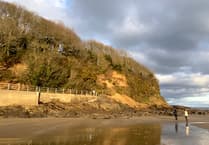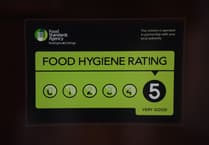Welsh family farm has sought inspiration from the indigenous farmers of the Andes to secure a future for the next generation.
Rob Izzard was farming beef cattle on the Pembrokeshire coast, but when his son, Iwan, joined the business the return from the 100-head herd wasn’t sufficient to support two incomes so a change of direction was needed.
A herd of adorable alpacas now occupy the farmland where Herefords and Aberdeen Angus cattle once grazed at Beavers Hill near Manorbier.
Visitors to the 60-acre holding can trek through the countryside leading Ted, Billy, Hugo, Donald or others in the herd of 10.
Although alpaca trekking experiences are not new to the UK, the adventure trek at Beavers Hill is one of the first in Wales and is already proving popular.
“We were planning to launch in March, but people have already been in touch to make bookings,’’ says Rob.
He took on the challenge of training the alpacas - all male and sourced from a breeder in Reading.
After housing the herd for six weeks and gaining their confidence, he introduced them to a halter.
After seven months of patience and perseverance the alpacas are now accustomed to their walks across the fields and woodland overlooking Swanlake Bay.
The animals all have different characters - on the treks some like to be followers rather than leaders, others to have their companion walking alongside them instead of in front.
The management of alpacas is similar to sheep - they eat grass and haylage and must be shorn once a year. But where they do differ is in their footcare - their toenails grow so rapidly that they must be clipped four times a year.
The alpaca trekking experience will run alongside Iwan’s glamping site at Beavers Hill. He established this with a single bell tent, but now has seven of these and also three geo-domes complete with hot tubs.
The farm with its multiple enterprises is very different to the business his great-grandfather had when he acquired the holding many decades ago, but by moving with the times he says he has been able to carve out a future for himself in the countryside where he grew up.
“Farming livestock is a numbers game now, for smaller businesses like ours to survive you have to use the land in different ways,’’ he says.
For bookings visit www.pembrokeshirealpacatrekking.co.uk




